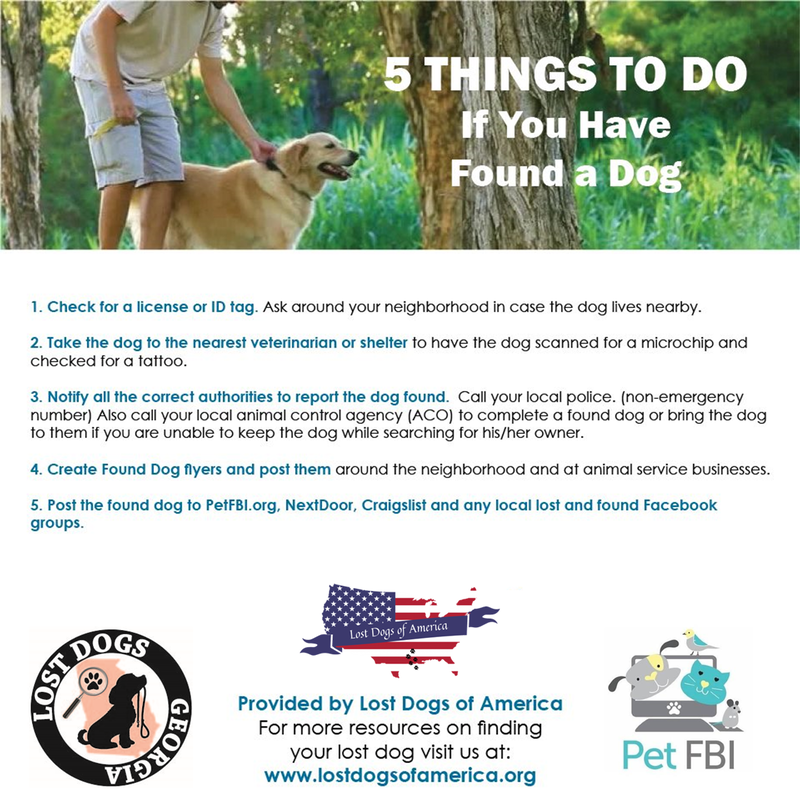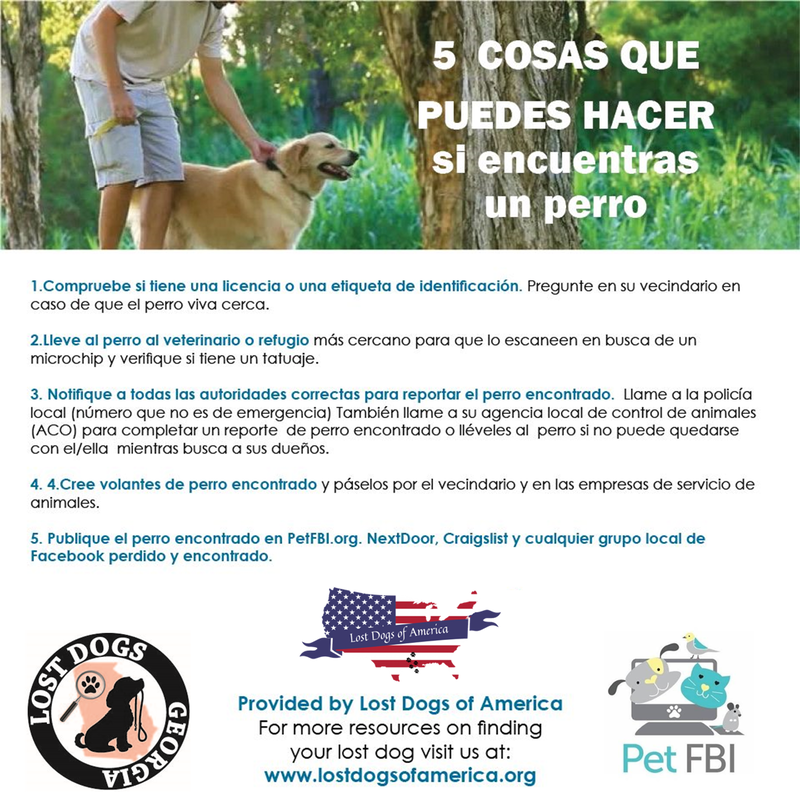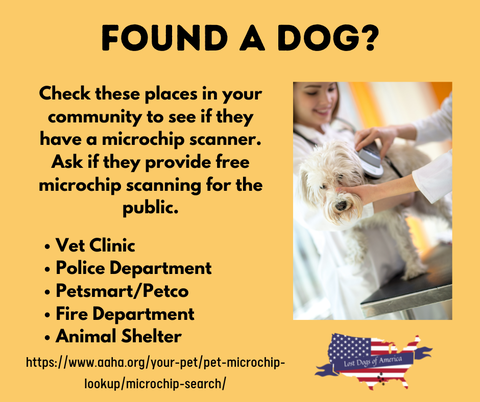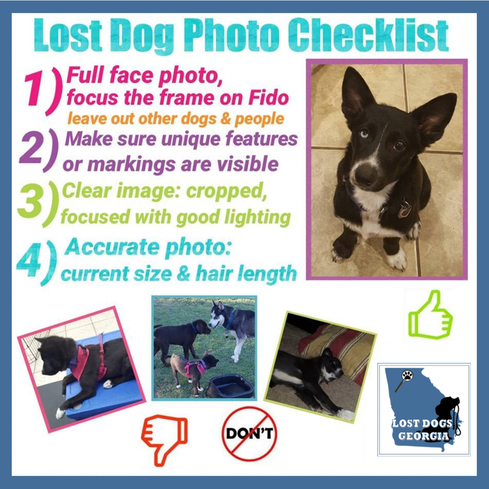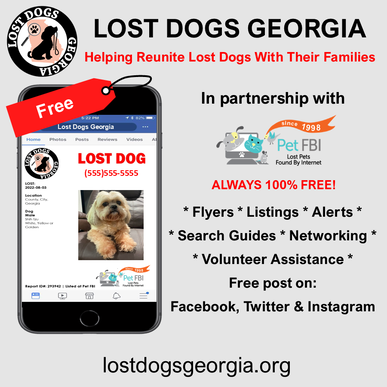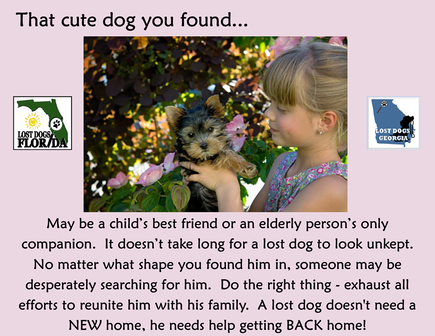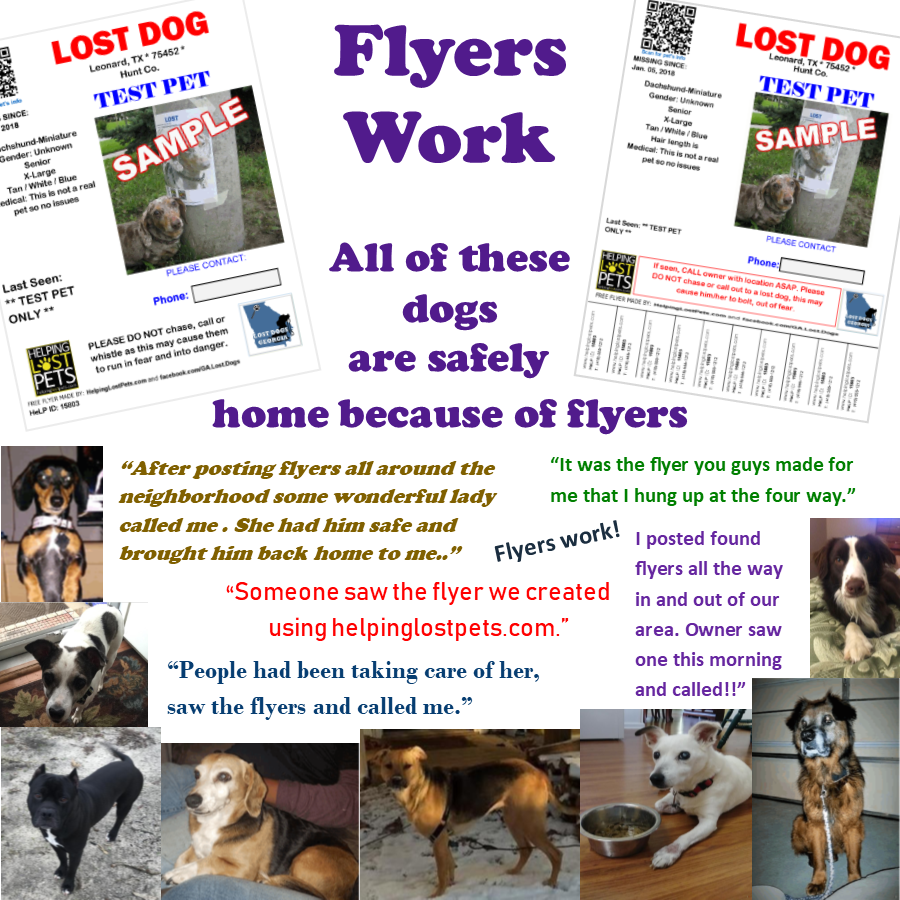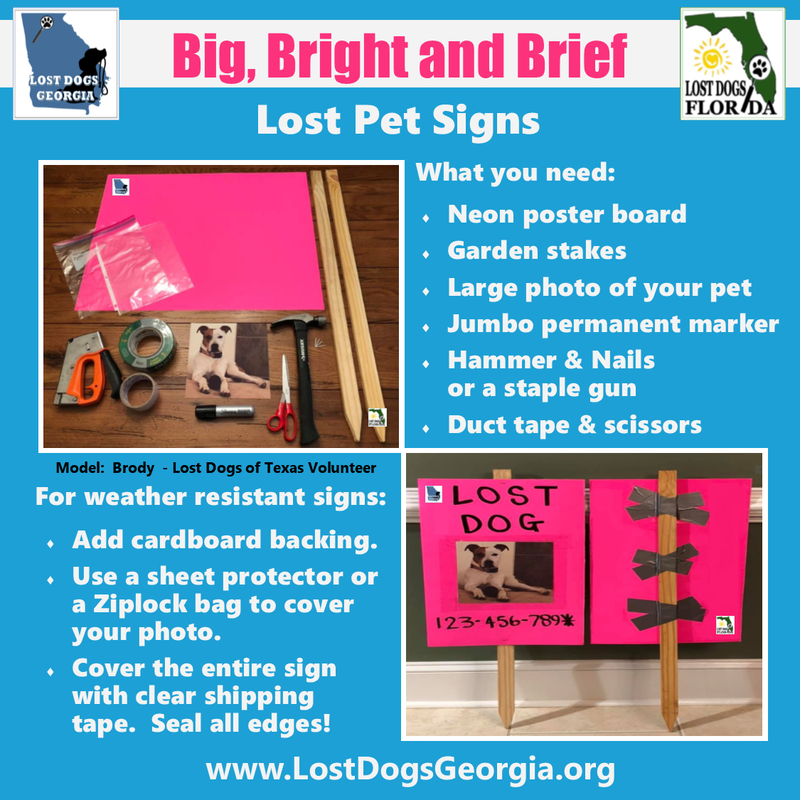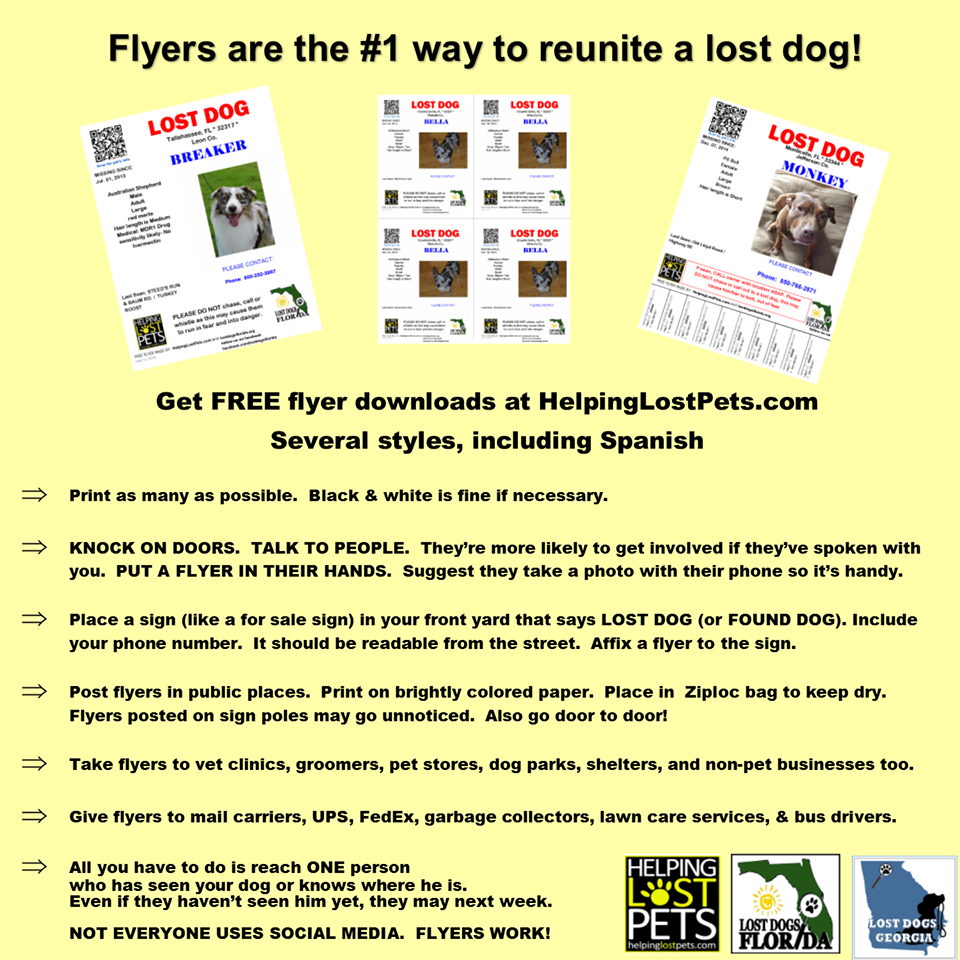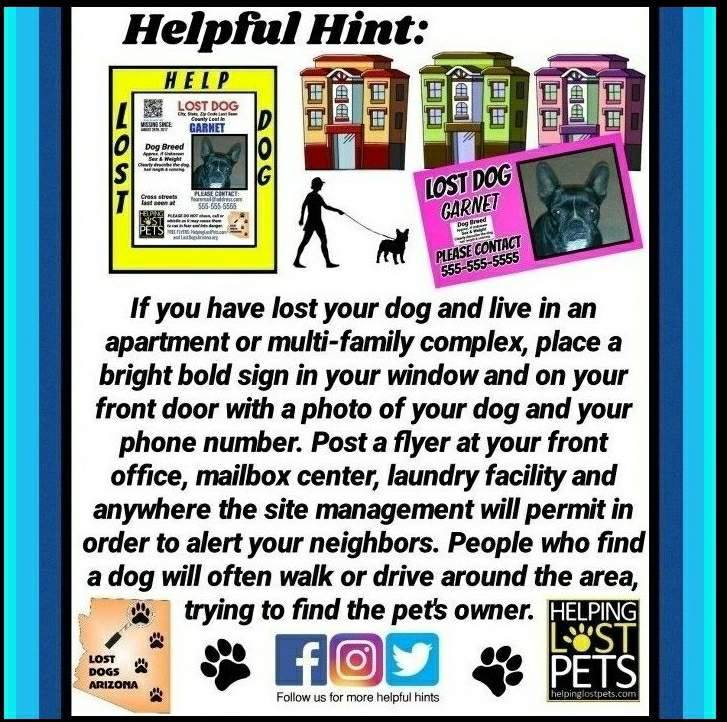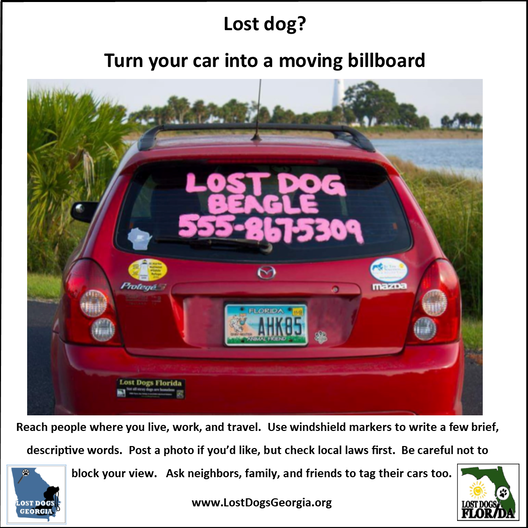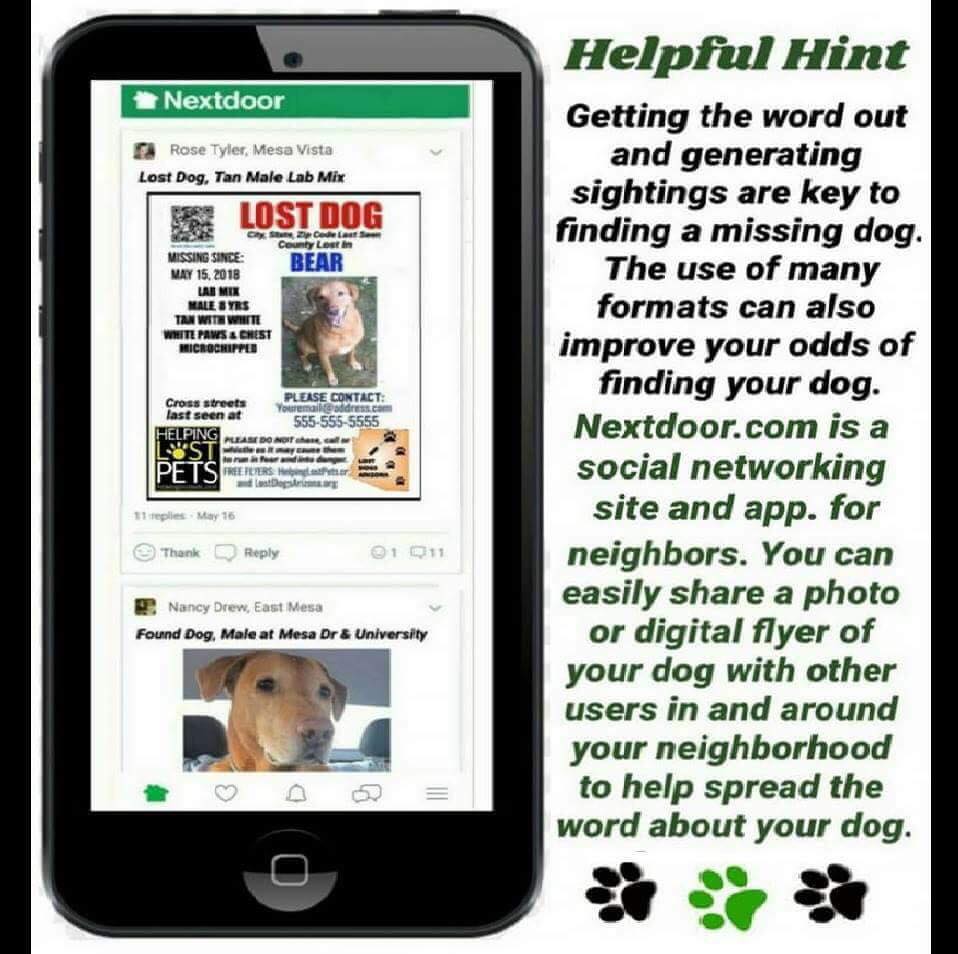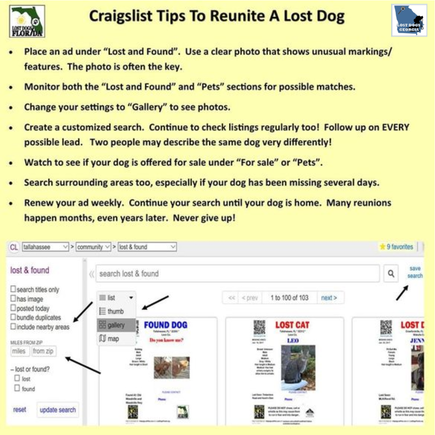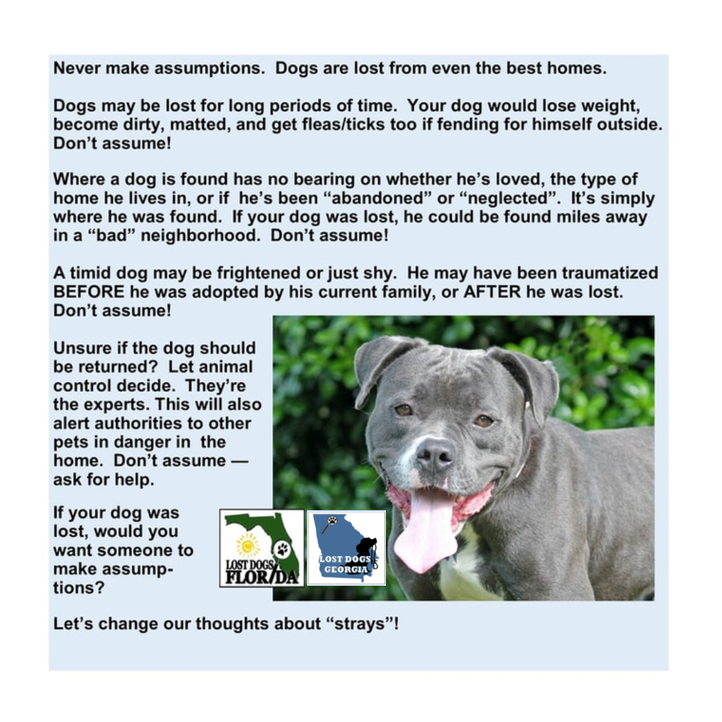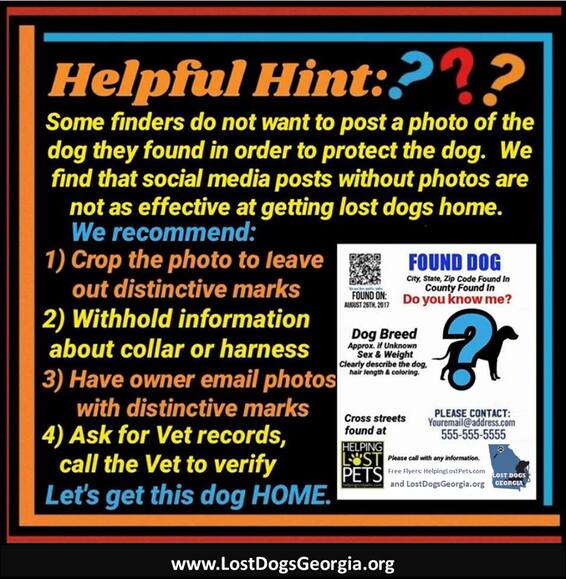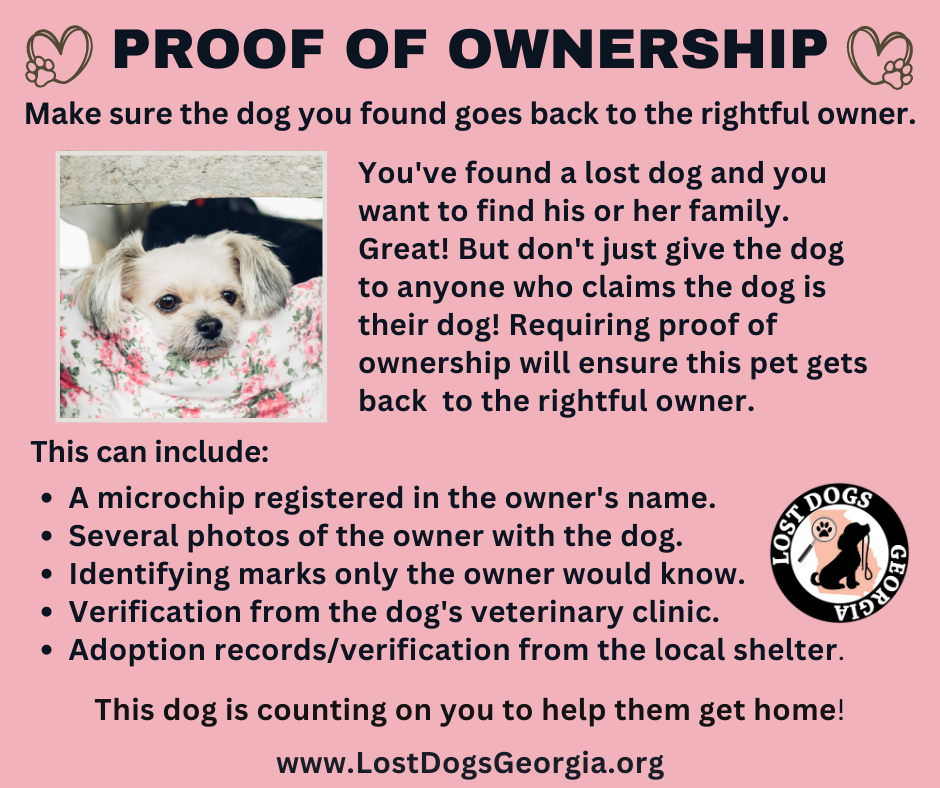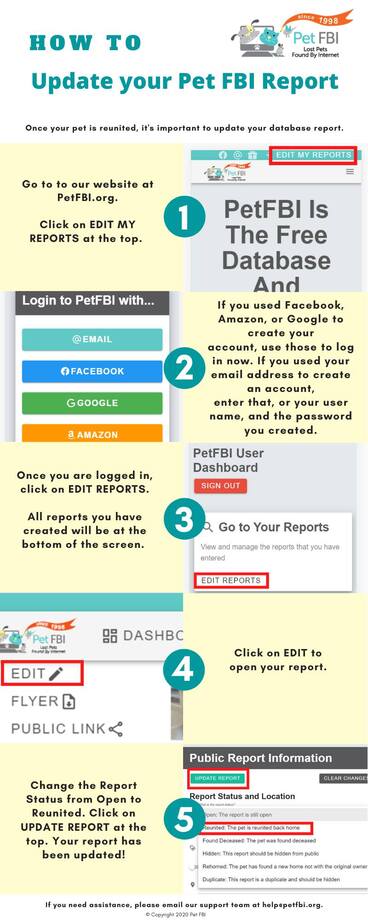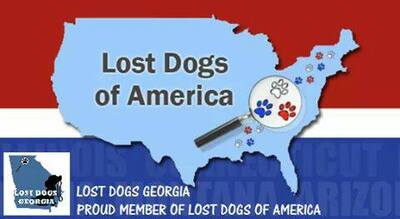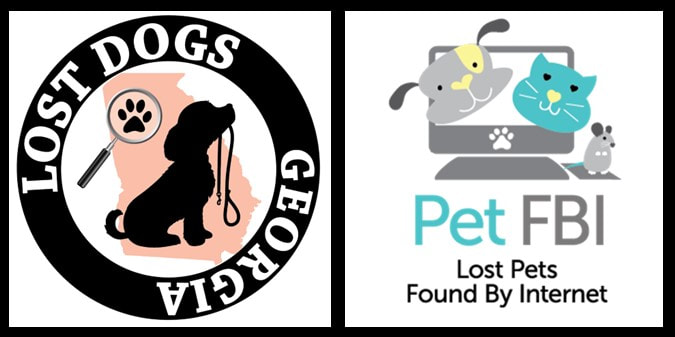- Welcome
- List a lost or found pet
- View our listings
- Lost Dog Guides
- Found Dog Guides
- Resources
- Testimonials
- Pet Disaster Checklist for Dogs and Cats
- Lost Pet Scams
-
Blog Spot
- Holidays, pets and fireworks
- What everyone who finds a dog needs to know
- Spike's Blog - Lessons on Found dogs
- A tribute to Spike - Our canine Lost Dogs Georgia volunteer
- Connecting the dots to get lost pets home
- Mass Confusion in the lost and found world
- Gracie's story
- Lost Dogs Georgia - Media Mentions
- Volunteer Webpage
| Found Dog Action Plan - Printable version | |
| File Size: | 122 kb |
| File Type: | |
What to do if you've found a dog:
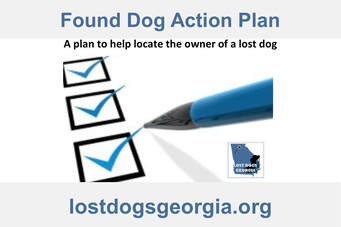
Consider the dog you found as lost, with a home and an owner; not a homeless stray. Never assume the dog you found was abandoned or mistreated regardless of its appearance or condition. Legally, dogs are considered property. This plan will help you do your “due diligence” to return this dog to its rightful owner.
Consider the dog you found as lost, with a home and an owner; not a homeless stray. Never assume the dog you found was abandoned or mistreated regardless of its appearance or condition. Legally, dogs are considered property. This plan will help you do your “due diligence” to return this dog to its rightful owner.
NOW LET'S GET STARTED:
Start by listing your lost or found pet with us. It's FREE! This puts your listing in our free, fully searchable nationwide database for lost and found pets. You'll also be able to download a free flyer to print and share.
NEXT LISTING, START WITH OUR FIRST FIVE THINGS TO DO BELOW:
There are many ideas here. Please don’t feel you have to do them all right away, but we feel it’s important to provide you with as many ideas as possible to help you find your dog. Start with our "5 things to do if you have lost your dog" in the photo tip below and then work your way down this list. We are an all volunteer group and all of our services are completely FREE.
IMPORTANT INFORMATION:
If you choose to proceed or have found this page after you’ve captured a lost pet, these are the steps you should take to try to locate the owner:
- Safety first. Safety is first and foremost when you spot a lost dog. There are various risks involved in approaching or attempting to capture an animal that is not your own. The dog may be aggressive or have an injury that may cause him to lash out or attack out of fear. Be aware of any signs of neurological behaviors such as stumbling, twitching or excessive drooling or anything that resemble possible signs of rabies, distemper or brucellosis. When in doubt, call animal control and never try to capture any animal you feel unsure about. You could cause it to run even further or it could result in an aggressive attack that is dangerous to both you and the animal. Another word of caution: If you find yourself in a position where you must care for an unknown pet, make sure to keep them away from other animals in the house to avoid any cross contamination of possible disease or parasites the animal may have. Make sure you protect your family, any other pets and the dog you found.
If you choose to proceed or have found this page after you’ve captured a lost pet, these are the steps you should take to try to locate the owner:
Immediately:
- Check for ID tags: If the dog is wearing a county tag, call the phone number on the tag to get information about the dog’s owner.
- Contact your local shelter and fill out the necessary paperwork. The shelter is the first place people check when they lose their pet, so it's very important that you take them there. You are legally required to contact the shelter, police, and/or animal control when you find a lost pet. Depending on the regulations at your particular shelter, you may not have to leave them there. Hopefully, the dog is microchipped and the owner can be easily contacted. Start with our list of shelters but ask about other organizations you may need to report to: Lost Dogs Georgia Shelter
- Contact shelters in the surrounding counties as well!!! Pets travel farther than we think. They may have been lost for some time, or may have hitched a ride with someone somewhere along the way. It's not uncommon for lost dogs to be found hundreds of miles from home. Ask if you can fax or e-mail your flyer to nearby shelters. For a list of Georgia shelters, go to: Lost Dogs Georgia Shelter
- If the shelter is closed and you’re unable to keep the dog until they reopen, call your local animal control or police department. Some counties have “after hours drop boxes”. Do not take the dog to a shelter in another county – the owner will not be able to find them in the short amount of time the shelter is required to hold the dog before he/she is either put up for adoption or euthanized.
- If you need to keep the dog in your home until the shelter reopens, keep them safely confined in a spare bedroom/bathroom or a securely fenced back yard until the shelter reopens - secure being the key word. You probably have a four-legged Houdini on your hands, who has already escaped once! If you aren't able to take them to your own house, ask a friend or relative if they can keep them temporarily.
- If you have your own pets, keep them separate. The lost dog may have a communicable disease which could be transmitted to your own pets. You also don't want either pet to be injured in a fight -- or YOU to be injured trying to break up a fight.
For a list of Georgia shelters, go to: Georgia Shelter List
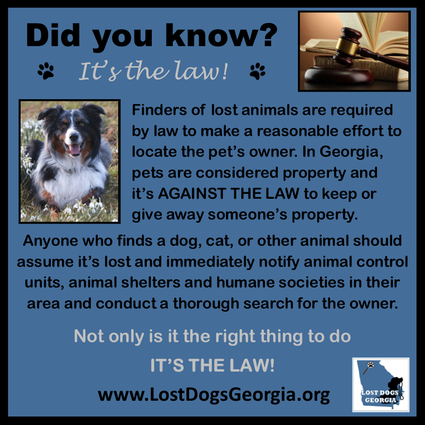
In Georgia pets are considered property and it's illegal to keep or find a new home for them without contacting your shelter, and taking the proper steps to find the original owner. Most lost dogs don’t need a new home, they need help getting back home!
Scanning for a microchip
- If you find a lost pet at a time when the shelter is closed, take them to a 24 hour emergency clinic to be scanned for a microchip. Ask if they have a universal scanner. Some brands of microchips may not show up unless read by this type of scanner. This makes it appear as if the pet does not have a microchip – even if they really do. It would be a shame for a family not to find their pet because the microchip was missed! Shelters typically have universal scanners that read ALL brands of microchips, but a veterinarian may not, so it's best to have them scanned at a shelter again when they reopen if there was no chip read at the vet’s office.
- Have the dog scanned for a microchip at any veterinarian office or shelter. This is a free service but call first to make sure they can do the scan. Make sure the scanner being used is a “Universal” scanner, able to detect all chips.
- If a microchip is not found, get a second scan using a different scanner by a different person, perhaps even at a different location. Microchips can migrate and be missed, or the scanner being used may be defective.
- Get the chip number and look it up at www.petmicrochiplookup.org. Call the company to report the found dog so the owner can be contacted. Some vets may do this for you. If no owner information is available or it is incorrect, ask for the name of the store, veterinarian, rescue or shelter that purchased the chip. Contact them to see if they have owner records.
- If you find the dog has a dead-end microchip, have the shelter or clinic request assistance at microchiphelp.com. This is a free service offered by Lost Dogs of America. Listings submitted through the Pet FBI system are automatically referred to microchiphelp.com when a chip number is listed.
- While you are at the vet, have them help you check the dog for tattoos. Tattoos are generally found inside the ear or on the inner thigh. Tattoos can be registered with companies who maintain owner information. National Dog Registry is one – www.NationalDogRegistry.com. Some breed clubs also keep a database of tattoo registrations.
Walk the dog:
- Put the dog on a leash and go for a walk - If you can safely do so, walk the dog around the neighborhood using a secure collar and leash. The dog may lead you to its home or you may find the owner walking around looking for their dog. Do not do this if you cannot control the dog.
- Look for lost dog signs in the immediate area. You can do a more thorough search when you are ready to post flyers/signs.
- Go door to door to see if anyone recognizes the dog. By knocking on a few doors, you can often find the owner or someone who can tell you where they live.
- Do not have the dog groomed or alter their appearance, as this can drastically change the way they look, making it less likely for them to be recognized by their family or people who are helping to look for them. Many volunteers help look for possible matches. This will make it difficult for them, or even their family, to recognize them.
- Talk to kids in the neighborhood. They spend more time outside and often know which house a dog is from. Go to the bus stop in the morning with a flyer.
- Notify your mail carrier: Mail carriers spend hours driving the roads in your neighborhood. They may recognize the dog and may know where he/she lives. Give them a flyer in case they spot a lost pet sign on their route.
Prepare photos for listings and social media post:
- Take a good photo of the dog: The photo should show the dog’s entire body with his face facing the camera, and any unusual features or markings. This photo will be used for many things we suggest on this list such as flyers and online post. Try to use the very best photo possible! A good photo may mean the difference between someone recognizing the dog - or not. If you have several photos that show the dog from different angles, you can use Pixlar Express to create a collage. Please crop out any distractions such as people, children, furniture and other pets. You want the photo of the dog to be large and the main focal point on the photo.
Search/List with Pet FBI & Lost Dogs Georgia (It's FREE!)
Search Our listings: Search the PetFBI free lost and found database to see if the owner has listed the dog as lost. Go to www.PetFbi.org to search. If you don't see the pet listed, immediately sign up for free alerts from Pet FBI so you’ll be notified when a pet is listed as lost in your area. Remember to remove Pet FBI from any spam filters.
Search Our listings: Search the PetFBI free lost and found database to see if the owner has listed the dog as lost. Go to www.PetFbi.org to search. If you don't see the pet listed, immediately sign up for free alerts from Pet FBI so you’ll be notified when a pet is listed as lost in your area. Remember to remove Pet FBI from any spam filters.
- No match? If you don't see the pet listed, immediately create your FREE found listing by going to PetFBI.org. This only takes a minute and instantly enters the pet in our FREE, fully searchable nationwide database for lost and found pets. Pet FBI is the largest FREE lost and found pet database in the nation with partner groups in every state. Your listing will be posted to the Lost Dogs Georgia Facebook page (if in Georgia) as well as to our other popular social media sites. Listing will also generate a free flyer for you to print and share. Please remember to proofread your listing and check for commonly known mistakes such as an incorrect phone number or the wrong gender of the pet. Make any changes necessary and save your changes before you log out.
- Sign up to receive free alerts: Pet FBI sends lost/found pet alerts to members of the network who have opted in to receive those alerts. This may be animal control units, veterinary clinics or even members of your own community wanting to help. Finders can also sign up for free alerts so they will be notified whenever a pet is listed as lost in their area. To sign up for alerts, go to: PetFBI.org. Remember to remove Pet FBI from from your spam filter.
Prepare flyers and intersection signs:
Flyers are the most effective way of reuniting a lost pet! When used in conjunction with signs, you create an awareness campaign on the ground that will reach hundreds of people who are passing by on their way to school, work, shopping, etc. and may be seen by the one person who has information about the lost pet.
IMPORTANT: DO NOT DELIVER FLYERS DOOR-TO-DOOR DURING THE COVID-19 OUTBREAK
Flyers are the most effective way of reuniting a lost pet! When used in conjunction with signs, you create an awareness campaign on the ground that will reach hundreds of people who are passing by on their way to school, work, shopping, etc. and may be seen by the one person who has information about the lost pet.
IMPORTANT: DO NOT DELIVER FLYERS DOOR-TO-DOOR DURING THE COVID-19 OUTBREAK
- Go door to door with flyers. - Start by printing a 4 per page mini flyer. Make at least 50 copies. These will be used to hand out to neighbors and people passing by the area.
- Place flyers in the area the dog was found, and at pet related businesses such as vet's offices, pet stores, etc. Post in places where people walk, and near schools where children will see them -- kids are observant.
- Look for “lost dog” flyers as you are out posting “found” dog flyers. Make sure you recheck the area routinely. Lost dog posters may not go up right away or there may be extenuating circumstances (owner is disabled, on vacation, etc.). It doesn’t mean the dog is homeless or unloved.
- Use brightly colored neon poster board to create Found Dog signs to post at intersections. Write 5 words or less in large black letters on the neon board. See below. - Place them where cars will be stopped long enough to read them, but be sure they're readable from a distance. They should be easily readable from the driver's seat of a car driving past without slowing down.
- Place a large sign out in your front yard (or where you found the dog) that says FOUND DOG and your phone number. It should be easily readable from the driver's seat of a car driving past without slowing down. The dog's family may drive the neighborhood, searching for their dog.
- Post flyers at the shelter and humane society in your area.
Tag your car:
Create awareness in your neighborhood by placing found pet flyers in the windows of your car. Use the largest photo possible with your only the words “FOUND DOG” and your phone number.
In addition, you can use your car as a rolling billboard by purchasing special markers designed for writing on car windshields. With the marker write FOUND DOG, breed, color, and your phone number. The people most likely to have lost the pet live in your area.
Create awareness in your neighborhood by placing found pet flyers in the windows of your car. Use the largest photo possible with your only the words “FOUND DOG” and your phone number.
In addition, you can use your car as a rolling billboard by purchasing special markers designed for writing on car windshields. With the marker write FOUND DOG, breed, color, and your phone number. The people most likely to have lost the pet live in your area.
Other areas to post and search:
- Nextdoor: Create a free listing using the Nextdoor App. It's a popular free site that is local to your neighborhood and your listing may be seen by someone in your area who knows the owner of the pet you found. IMPORTANT: While Nextdoor is a free app and has been very helpful in the recovery of lost pets, it has its limits. Only people in your immediate area are allowed to join your neighborhood group. That means if the owner is traveling and their dog is lost in a place other than home or crosses county lines, the owner may not have access to the Nextdoor site where the dog is listed as found. Shelters and clinics are also restricted from searching every neighborhood site in your area. This is why it is vitally important to enter the dog's information into the Pet FBI centralized database where listings are visible to anyone who searches our listings.
- Monitor Craigslist lost and found section: Many owners will place a lost ad on Craigslist. Listings for lost pets can be found under the "Lost and Found" section, so check there frequently to see if the pet has been listed as lost. In addition, create your own “found listing” using a clear photo of the pet. Remember to use caution when responding to any online reply to your found pet listings. ALWAYS ask for proof of ownership such as photos with the dog and ALWAYS take someone with you and meet in a well known and busy area.
- Monitor online social media sites: Social media has become a very popular tool for owners with lost pets. Many sites will allow you to post your listing free of charge and followers will help monitor the sites for a match. Places to watch include local and state Facebook pages and groups. Local shelter, rescue and veterinary clinic pages and online yard sale groups for your community. Check these sites often to see if the owner has posted a lost listing.
- Alert your Homeowners Association and other neighborhood organizations. Post to the Facebook pages for these organizations. Check back often for lost dog posts.
Social Media Works!
- Watch the Lost Dogs Georgia Facebook page. If you've listed, watch for comments under the flyer of the dog you found since people will often comment there instead of contacting you. If you “tag” yourself under the comments you’ll get updates from Facebook.
- Watch other Facebook pages and groups: There are many Facebook pages dedicated to lost and found pets. Post to as many as you can. We recommend sharing the post from Lost Dogs Georgia so that when it’s removed because the dog has been reunited, the shares will also be removed. Post to Georgia's Missing Pets, another large lost and found site in Georgia.
- Post to local Facebook pages: Sell/Swap pages, HOA pages, your own personal page.
- Newspaper - Post and check ads in local newspapers. Many newspapers will post a free ad for found dogs.
Check your email and voicemail:
- Check your email regularly (spam box too) for comments generated through the Pet FBI. We have “tweeted” your flyer on Twitter and Text alerts and e-mails have been sent to people who have signed up to receive them through our partner Pet FBI.
IMPORTANT NOTE:
A dog that’s lost will look dirty, uncared for, and thin after spending a few days outside. They’ve been trying to survive on their own. This doesn’t mean they came from a bad home, or that their owners are not properly caring for them. All pets look scruffy when they’ve been lost and roaming the streets for a few days. The majority of lost pets have a family that is looking for them. Please help them find their family.
In the state of Georgia pets are considered property and it's illegal to keep or find a new home for them without contacting your shelter, and taking the proper steps to find the original owner. They don’t need a new home, they need help getting back home!
A dog that’s lost will look dirty, uncared for, and thin after spending a few days outside. They’ve been trying to survive on their own. This doesn’t mean they came from a bad home, or that their owners are not properly caring for them. All pets look scruffy when they’ve been lost and roaming the streets for a few days. The majority of lost pets have a family that is looking for them. Please help them find their family.
In the state of Georgia pets are considered property and it's illegal to keep or find a new home for them without contacting your shelter, and taking the proper steps to find the original owner. They don’t need a new home, they need help getting back home!
- Don’t be afraid to provide a picture and information. There are many caring people who monitor Craigslist and social media to help reunite lost pets with their families by matching pictures/locations/and other details. If you are worried about someone trying to claim a pet that isn't theirs, ask them to provide photos of the dog as proof of ownership. It’s a good idea to meet the possible owner in a public location such as your local shelter. If you are unsure whether they’re truly the owner, or have questions about the safety or care of the dog, you can surrender the dog to the shelter, and the owner can reclaim their pet after speaking to shelter staff or an animal control officer.
Additional information about your Pet FBI / Lost Dogs Georgia listing:
- Lost Dogs Georgia and Pet FBI work in partnership to help more missing pets get home. When we receive your listing we will post your dog's flyer to our Facebook page. The link to your post on our page can be found in the email you receive through the Pet FBI system. Use the link supplied to be taken to your post. Then “tag” yourself or comment on the post to ensure you receive updates from Facebook. Often someone who has information about your dog will post a comment on our page instead of contacting you. It is your responsibility to monitor your dog's post to watch for any new information from our followers. Also check your email regularly (spam box too) for emails generated through the Pet FBI system.
- Watch the "Community" section on our Facebook page. Many lost pets are listed here and we've seen many happy reunions from post created in that section. The link to our "Community" section can be found by clicking THIS link.
Reuniting the dog with family:
To make sure you’re returning the dog to the rightful owner: When someone comes forward to claim them check to make sure they're really the owner. Do they have a picture of the dog? Can they describe something about the dog that didn’t show on your flyer, such as collar color, an unusual feature, a scar, etc. Unfortunately, someone might try to claim a dog that isn’t theirs. You want to make sure that you're giving them to the right person, so they get back safely to their family! Their fate is in your hands!
To make sure you’re returning the dog to the rightful owner: When someone comes forward to claim them check to make sure they're really the owner. Do they have a picture of the dog? Can they describe something about the dog that didn’t show on your flyer, such as collar color, an unusual feature, a scar, etc. Unfortunately, someone might try to claim a dog that isn’t theirs. You want to make sure that you're giving them to the right person, so they get back safely to their family! Their fate is in your hands!
- When someone calls in response to an ad and/or flyer, ask the caller’s name and telephone number and tell him/her that you will call right back. This will give you their information in case you need it later.
- Do not offer a description of the dog, let the person inquiring describe the dog including unique identifying characteristics (e.g. scars, tattoos, behaviors, color patterns, collar/harness, etc.). Also have them tell you when and where the dog went missing.
- Ask for proof of ownership via email or text. Examples include vet records (call their vet to confirm), rabies certificate or license, adoption papers, registration papers, transfer of ownership or bill of sale, photos that are dated and with family members.
- If you are meeting to return the dog, be sure to let a friend or family member know where you are meeting or ask someone to come along. Plan to meet at your local police parking lot, your vet office or their vet office. Make sure it’s a public place in daylight. If you meet at a police station, go into the police station first to inform them of what is happening, so they can keep an eye out.
- Observe the meeting of the dog and person. Does the dog show familiarity with the person? Be aware that a dog who has been missing a long time or who has been in survival mode may not immediately show familiarity or affection so do not be alarmed if this happens. It may take time for a long-lost dog to recognize their owners or feel comfortable with them.
- If the dog didn’t have a collar or tags when you found it, please encourage the owner to bring them when you meet. You may also want to educate them on microchips, if needed.
After you have reunited the dog with the owner:
NOTE: On our back home report we include a short survey. We appreciate details on how the dog was reunited with their family. This helps us gather information about which strategies are most successful. We use this to develop better methods for finding other pets and share this with shelters, rescues, and animal control facilities. We also love to share stories of happy reunions and how they occurred.
Disclaimer: We reserve the right to screen these surveys and post only what we feel is appropriate. We do not allow profanity, negative remarks or mention or referrals to paid sites, dog trackers, pet communicators or other paid services. While many of these sites and people are legitimate, we simply don’t have the time to research and screen every person and every service out there. We want this site to be a safe place where owners can view the suggestions on our page without fear of being scammed. Thank you for understanding.
- Remove all flyers and posters. Take down web postings and discontinue ads. Let all agencies you contacted know the dog has been reunited with their family and thank them for their assistance.
- Update the status of the dog on PetFBI.org. This hides the listing on our map and allows our volunteers to remove your post from our Facebook page. This also allows volunteers and shelter employees who frequent both sites to look for matches more efficiently by allowing them to focus their efforts on pets that are still lost and truly need their help.
NOTE: On our back home report we include a short survey. We appreciate details on how the dog was reunited with their family. This helps us gather information about which strategies are most successful. We use this to develop better methods for finding other pets and share this with shelters, rescues, and animal control facilities. We also love to share stories of happy reunions and how they occurred.
Disclaimer: We reserve the right to screen these surveys and post only what we feel is appropriate. We do not allow profanity, negative remarks or mention or referrals to paid sites, dog trackers, pet communicators or other paid services. While many of these sites and people are legitimate, we simply don’t have the time to research and screen every person and every service out there. We want this site to be a safe place where owners can view the suggestions on our page without fear of being scammed. Thank you for understanding.
Need more help?
If you have questions or we can help in any way, please e-mail us at LostDogsGeorgia@gmail.com.
Thank you for helping keep this dog safe until their owner can be found. There are a lot of ideas here; we hope they enable you to make someone very happy by reuniting them with their lost pet! ~ Lost Dogs Georgia
About Lost Dogs Georgia
We are an all-volunteer group dedicated to reuniting lost dogs with their families. All of our services are provided free to dog owners, shelters/rescues, and animal control facilities.
Our mission:
If you have questions or we can help in any way, please e-mail us at LostDogsGeorgia@gmail.com.
Thank you for helping keep this dog safe until their owner can be found. There are a lot of ideas here; we hope they enable you to make someone very happy by reuniting them with their lost pet! ~ Lost Dogs Georgia
About Lost Dogs Georgia
We are an all-volunteer group dedicated to reuniting lost dogs with their families. All of our services are provided free to dog owners, shelters/rescues, and animal control facilities.
Our mission:
- Provide ideas and resources to help owners locate their lost dogs
- Offer finders of lost dogs effective methods to reunite these dogs with their owners
- Reduce the number of "strays" in shelters, decreasing euthanasia rates
- Increase awareness that often a lost dog doesn't need a new home; they just need help getting back home.
We hope your lost pet is home soon!
Lost Dogs GEorgia
LOST CATS GEORGIA
- Welcome
- List a lost or found pet
- View our listings
- Lost Dog Guides
- Found Dog Guides
- Resources
- Testimonials
- Pet Disaster Checklist for Dogs and Cats
- Lost Pet Scams
-
Blog Spot
- Holidays, pets and fireworks
- What everyone who finds a dog needs to know
- Spike's Blog - Lessons on Found dogs
- A tribute to Spike - Our canine Lost Dogs Georgia volunteer
- Connecting the dots to get lost pets home
- Mass Confusion in the lost and found world
- Gracie's story
- Lost Dogs Georgia - Media Mentions
- Volunteer Webpage


